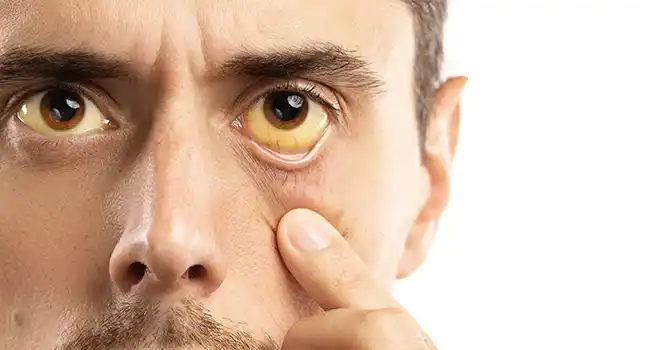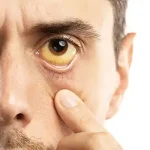Yellowing of the eyes, medically referred to as scleral icterus or conjunctival icterus, occurs when the white part of the eye (sclera) develops a yellow tint. This symptom is often associated with jaundiced eye symptoms, typically reflecting an imbalance in bilirubin metabolism or an underlying systemic condition, most commonly related to the liver.
Bilirubin is a yellow pigment released during the breakdown of red blood cells. Typically, the liver processes this pigment and eliminates it from the body. However, when bilirubin levels rise due to liver dysfunction, blood disorders, or bile duct blockages, they begin to accumulate in tissues, causing visible yellowing, particularly in the eyes, where the sclera’s affinity for bilirubin makes the discolouration more evident.
Understanding the various causes, related symptoms, diagnostic procedures, and yellow sclera treatment options is vital for appropriate medical care.
Common Causes of Yellow Eyes
The causes of yellowing eyes can be grouped into three broad categories: hepatic (liver-related), hemolytic (blood-related), and obstructive causes affecting the bile ducts.
Liver Disorders
- Hepatitis: Viral forms such as hepatitis A, B, and C can lead to liver inflammation. This inflammation impairs the liver’s capacity to process and eliminate bilirubin effectively.
- Liver Cirrhosis: Chronic damage due to alcohol use, non-alcoholic fatty liver disease, or prolonged viral hepatitis can cause liver scarring, limiting its function and contributing to jaundice and scleral icterus causes.
- Liver Cancer: Cancerous liver growth may block bile flow, resulting in bilirubin buildup.
- Genetic Liver Conditions: Inherited disorders such as Gilbert’s syndrome can interfere with bilirubin metabolism, causing periodic yellowing of the eyes.
Blood-Related Conditions
- Hemolysis: Accelerated breakdown of red blood cells leads to increased bilirubin production, overwhelming the liver’s capacity to eliminate it.
- Sickle Cell Disease: Abnormal red blood cells have a shorter lifespan, releasing more bilirubin into the bloodstream.
- Malaria: The parasitic infection can destroy red blood cells, contributing to jaundice and yellowing of the eyes.
Bile Duct Obstruction
- Gallstones can block bile ducts, preventing bilirubin from being excreted effectively, leading to conjunctival icterus.
- Pancreatic Cancer: Tumours in or near the pancreas may compress the bile ducts, obstructing bile flow.
- Cholangitis: Inflammation of the bile ducts restricts bile movement, causing bilirubin accumulation.
Yellow Eyes Symptoms
In addition to discolouration of the sclera, other jaundiced eye symptoms may arise depending on the underlying condition:
- Fatigue and Weakness are common in liver and blood disorders.
- Abdominal Pain: Often associated with gallbladder disease or liver inflammation.
- Dark Urine: A result of excess bilirubin being excreted by the kidneys.
- Pale or Clay-Colored Stools: Indicates reduced bile presence in the gastrointestinal tract.
- Nausea and Vomiting: Frequently seen in liver and biliary conditions.
- Itchy Skin: Bilirubin buildup may cause skin irritation and itching.
Recognising these symptoms in conjunction with yellow eyes can prompt early diagnosis and appropriate treatment.
Yellow Eyes Diagnosis
When conjunctival icterus or scleral icterus is observed, healthcare providers undertake a detailed diagnostic evaluation to identify the underlying cause:
- Blood Tests: Liver Function Tests (LFTs) evaluate bilirubin levels and liver enzymes to detect inflammation or liver damage.
- Complete Blood Count (CBC): Helps identify anaemia or infections contributing to jaundice.
- Imaging: Techniques like abdominal ultrasound, CT scan, or MRI examine the liver, gallbladder, and bile ducts.
- Liver Biopsy: A small tissue sample may be analysed for further insight if chronic liver conditions are suspected.
Treatment Options for Yellow Eyes
The choice of yellow sclera treatment depends entirely on the root cause. Timely and appropriate care can help manage the symptoms and restore the standard eye colour.
Medical Treatments
- Liver Disease Management: Treatment varies based on the diagnosis. Antiviral therapies may be used for hepatitis. Lifestyle modifications, including nutritional guidance and alcohol abstinence, are recommended for fatty liver disease. Liver transplants may be considered in advanced cases.
- Gallstone Management: Gallstones causing biliary obstruction may require surgical intervention, such as cholecystectomy (gallbladder removal), or less invasive procedures like endoscopic retrograde cholangiopancreatography (ERCP).
- Blood Disorders: Conditions like sickle cell disease may be managed through medication, dietary changes, or blood transfusions, depending on severity.
Home Care and Prevention
Although medical treatment is critical for underlying conditions, supportive care can play a role in recovery and prevention:
- Hydration: Adequate fluid intake helps maintain liver function and supports detoxification.
- Balanced Diet: Emphasising fruits, vegetables, whole grains, and lean proteins can support metabolic and liver health.
- Avoid Alcohol and Toxins: Reducing alcohol intake and avoiding exposure to harmful substances may decrease liver strain.
- Eye Comfort: Wearing sunglasses can reduce discomfort caused by sensitivity to light when yellowing of the eyes is present.
Conclusion
Yellow eyes, or scleral icterus, are not a condition but a symptom of underlying medical concerns, ranging from liver disorders to bile duct obstruction and blood-related diseases. Identifying the cause of yellow eyes and initiating treatment promptly is essential for effective management.
If you or someone you know experiences persistent yellowing of the eyes accompanied by jaundice eye symptoms, a medical evaluation is recommended to assess the condition and explore appropriate treatment options.
Take the first step toward a healthier vision. Schedule an appointment
FAQs
Not always. While liver dysfunction is a common cause, yellow eyes can also result from conditions affecting red blood cells or bile ducts.
In some cases, such as Gilbert’s syndrome or temporary dehydration, yellow eyes may resolve without intervention. However, medical evaluation is advised to rule out serious causes.
Preventative measures include maintaining liver health through a balanced diet, avoiding excessive alcohol consumption, and undergoing regular medical checkups to monitor systemic health.
If eye yellowing is persistent or accompanied by fatigue, nausea, dark urine, or abdominal discomfort, consultation with a healthcare provider is recommended.





